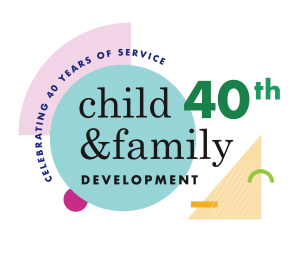By Mallory Bushee, MSOT, OTR/L, Child & Family Development
Washing hands is always important, and now is a great time to ensure your child is mastering the skill. It’s also a good time to try some new strategies to guide them through the process. It may seem like a simple task, but hygiene skills are often difficult for children to master. Many times it’s because it involves multiple steps, or kids simply don’t see the value (to them it may be seen as wasted time they could be playing). Here are some tips to help make it fun while building personal hand hygiene skills for kids throughout various ages and abilities.
Visuals are very useful to remind and guide your child through the steps (turn on the water, wet hands, get soap, scrub (20-30 seconds), rinse, dry, turn off water). A step-by-step visual like the ones provided by the Centers for Disease Control can be posted by sinks throughout your child’s environment. I find it’s often helpful to make them personal. If your kids like dinosaurs, use a visual schedule with dinosaurs washing hands. I also find it helpful to change it up every once and a while, add a surprise or a joke on the visual so your kids are motivated to look at, and don’t start to overlook it with time. If you would like help creating a visual, contact your OT.
Just as important as learning the steps to the task is learning all the parts of the hands that need to be cleaned. Many kids just scrub the palms together. It is important to teach our young ones to wash palms, between fingers, backs of hands, thumbs, fingernails. This can be learned through demonstration and remembered through repetition and catchy songs.
Videos and songs are very helpful in mastering the steps and ensuring a thorough cleaning. Most of the songs are super catchy and will probably get stuck in your head for the whole day. But remember, if it gets stuck in your head, your kiddo is more likely to remember it, too. Many nursey rhymes have been adapted into handwashing songs. I encourage you to find one that is a favorite for your kids.
– “Washy Washy Clean Clean” sings about the areas of the hands to clean
– Sesame Street has some good videos for younger ones
Dirt and germs are not always visible. If kids don’t see the germs, they may not see the need to clean their hands. Teach children when they need to wash their hands: coming in from outside, leaving shared play areas, after using the bathroom, if they cough or sneeze, before eating. Try to make it clear and add it to a routine.
If you’re trying to help your child understand the importance of hand hygiene and how to be more thorough, try out some fun science experiments. Here is one I found that can be effective – all you need is a little kitchen oil, cinnamon, and of course soap and water. Apply a small amount of oil to your kiddo’s hands, then sprinkle a little cinnamon on top (sounds like a baking tutorial so far). Use the oil to signify dirt and grime and the cinnamon to signify germs. Have your child first try to “clean” their hands with just water. Spoiler alert: it won’t work. Now have your child use soap. The soap will counteract the oil and wash it away. If your child tends to rush through washing their hands and not spend an appropriate 20-30 seconds scrubbing all areas of the hand, have them smell their hands. The cinnamon smell will likely be lingering, and you can use this to teach them the importance of thorough scrubbing.
Remember, if soap and water are not accessible at the time, hand sanitizer and wet wipes are useful in defending against germs. Hand sanitizer and wet wipes can also be good stepping stones to build independence for kids who are unable to get to the sink on their own or those who are fearful of the bathroom. When using these continue to teach the child all the areas of the hands to rub.
Mallory Bushee is a North Carolina Licensed Occupational Therapist at Child & Family Development. Occupational therapy focuses on helping kids with everyday activities such as handwashing, staying organized and focused in the classroom or playground, managing sensory input and their own behaviors, as well as stretching and strengthening their muscles.
Child & Family Development

Website
Facebook
Instagram
Twitter
Locations:
Mitdtown:
4012 Park Road, Suite 200
Charlotte, NC 28209
704.332.4834
Pineville:
10516 Park Road
Charlotte, NC 28210
704.541.9080



